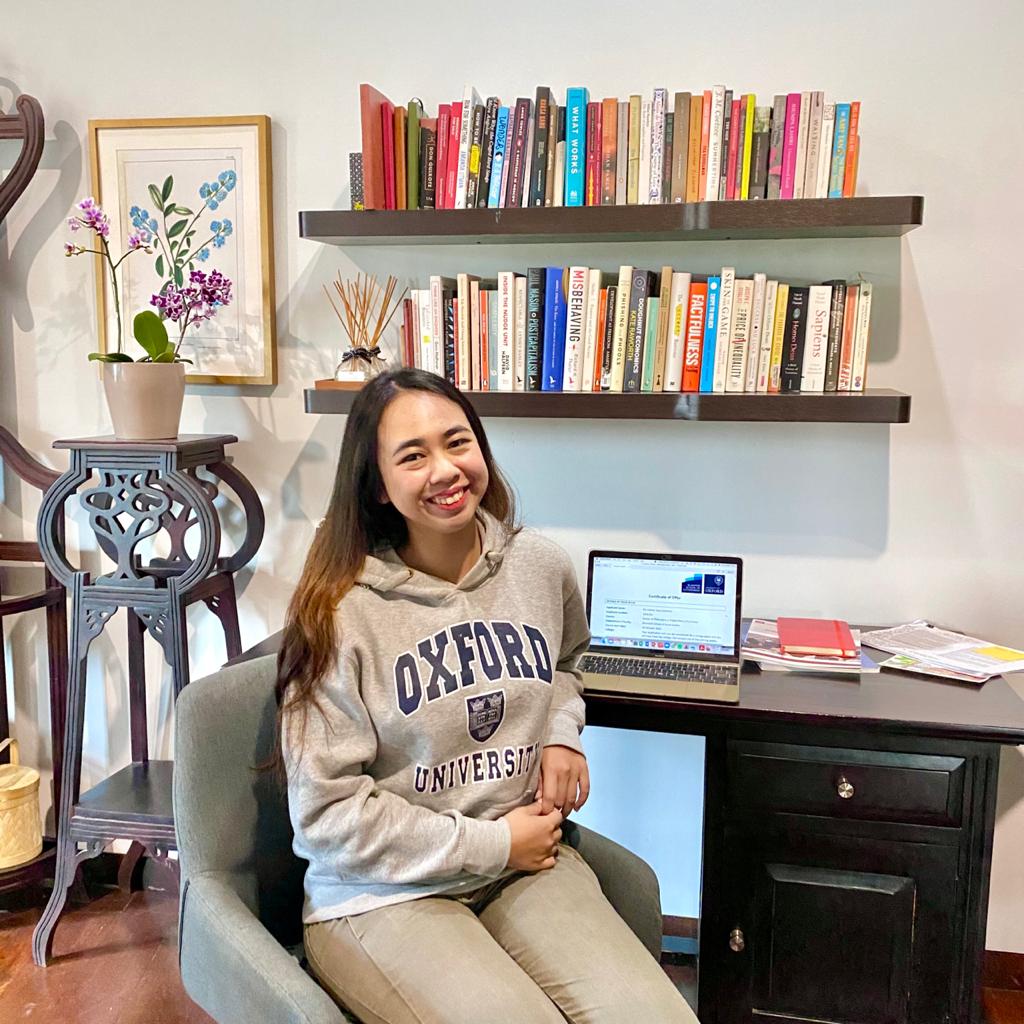Honoured with a distinction from the London School of Economics and Political Science (LSE), as well as being a young political candidate upon graduation, are among Amirah Kaca Sumarto’s achievements. However, it does not mean that she has an easy road to success. Kaca had been dealing with her self-doubts throughout her journey until she was finally awarded scholarships to study at the University of Oxford this year. This article is a reflection of her on how she finds resilience within herself.
I submitted my PhD applications at the end of December/early January, and since then, many wonderful things have fallen into place. I’ve been accepted in all the three universities I applied to, and I will be starting a doctoral degree in Public Policy at the University of Oxford this October. I even received offers from two prestigious scholarships (Clarendon and Jardine) to study at the university of my choice. The journey felt like smooth sailing as I had been successful on the first try. When the Indonesia Mengglobal team told me that ‘resilience’ is this month’s theme and requested me to write an article on resilience within the context of a PhD application, I initially felt a bit unsure. With its lack of rejection, I wondered how my experience could be a good story about resilience and overcoming adversity. I just felt that I have been fortunate, and it doesn’t sound very inspiring. But after reflecting further, I realized that this fortunate journey is still a worthy story on resilience. Here’s why.
During my Master’s degree, I promised myself that one day I would pursue a PhD. However, I decided to gather some more work experience after graduation. It started with an exciting year at the World Bank, followed by another exciting year campaigning full time as a political candidate. Until now, it is doing many things at once at the intersection of politics, policy, and governance. I got carried away, and almost four years had passed before I started to give a PhD application some serious thoughts.
At first, I questioned my suitability and fit for a PhD as someone away from research and academic work for a long time. This resulted in many self-doubts despite the increasing desire to pursue the PhD. I kept questioning: Will I be a desirable candidate for a PhD if I never publish any paper? Do I still have the ability to do a PhD after no longer doing analytical work in my current job? Will they consider me too old to start a PhD at 32 years old? Where can I get a great idea for a research proposal? Will professors at my previous school remember me to give references, even after four years? Will my role as an active politician reduce my chances of being accepted?
I know that applying to schools, especially competitive ones, is a game of grit and resilience. I did not expect the biggest hurdle to overcome and fight something that comes from within me. Self-doubt is a fear of failure, and it prevents one from even trying. It can also make you wary and over-cautious. This lack of courage might be the one that sabotages your chances. This challenge is not special to me; most people can understand how paralyzing a big dream can be.
Fortunately, it occurred to me that instead of wallowing into my self-doubts, I should start asking objective views from other people. The first person I reached out to was the programme director of my master’s at the LSE. After that, I reached out to friends and acquaintances who have completed or are currently pursuing PhDs. I even reached out to current PhD students at my target schools. I ask them all the same question, “Do you really think a person like me could do a PhD at this school?”
The more people I opened up to and talked to, the more strengths that I collected. It is true that when you are in doubt, you need the right words in your mind. When I talked to a former classmate about my plan, she told me, “Yes, you should apply. You were such a good student.” When I told a different friend that I am scared that my analytical skills are now rusty to start PhD, she replied, “But you are always analytical. You’re a thinker and a nerd.” When I was feeling unworthy in comparison to the brilliant profiles of PhD students at the University of Oxford, a PhD graduate from the school wrote back to me, “It would be great if you end up here – you have a great profile and have a good chance of getting in.”
Feeling unsure about my research proposal and personal statement, I got as many people as I could to read them. Not all of them provide encouraging feedback. A friend had commented on my first draft of a personal statement, saying, “the writing does not hold you in good light at a university like Oxford”. It felt like a big punch in the gut. Trying to process the criticism objectively while trying to balance the remaining confidence was challenging. Eventually, though, knowing I had received a lot of radical candour increased my confidence in the quality of my application.
Perhaps those friends don’t realise how profound their words and acts were, but they all have contributed greatly to my confidence and, thus, my success. Talking to them made me realise that all my previous struggles, failures, and efforts had equipped me well for this journey. Indeed, the moment you decide to apply for something, how likely you will get accepted is largely determined by your current profile and achievements. You can’t change yourself dramatically in a few months, so your existing capacities already determine that probability. At that time, I was, in fact, ready for my PhD dream.

I reflected further on what made me successful in my application: academic achievement, colourful work experience, and even knowing some of the right people. None of this would have been possible without trying, working, and in many cases, failing hard.
Fortunately, I received a distinction for my master’s, something that the selection committee of my scholarship complimented on. If you read my article about getting a distinction here, you will understand that getting one takes a lot of effort. I struggled during the first term of my Master’s degree at the LSE. Discipline in reading research papers, revising, and exploring the concept beyond the classroom had enabled me to get a distinction at last.
Another thing that might appeal to the selection committee is my practical experience in public policy and politics. Switching my career from the private sector to the public policy field was a leap of faith. I did risk-taking to enter politics and run for election. If I didn’t get back up from a big electoral loss and decided to stay in politics, I wouldn’t have such a unique profile. Some of my current projects have greatly inspired my proposed research. But before I secured those projects, there were a lot of proposals that didn’t get through.
Resilience is the building block of any life’s achievement, including getting accepted at the school of your dream. Your success is a product of your whole life’s resilience, not only what you display during the application process. Being consistent in achieving excellence in various aspects of life will equip you for any competitive process. From my experience, I have also learnt that you don’t always have to be a lone hero, deriving resilience from mere internal strength. Resilience is formed by having a healthy support network. Resilience is formed by accepting kindness for others. If you need more strength, look around you and perhaps like me, you will also find so many kind souls that you can reach out to.
*All photos are provided by the author









